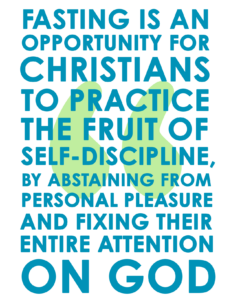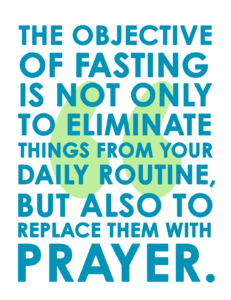WHAT IS FASTING?

As you prepare to embark on Seek25, you may be shocked to find out that scripture does not require Christians to fast. You might ask yourself, if scripture doesn’t require us to fast then why should we? While scripture does not require Christians to fast, scripture does reveal the importance of fasting. In the Old Testament, fasts were frequently called forth by leaders of a congregation during critical and despairing times (Jeremiah 26:9, Joel 1:14, Daniel 1:8). In the New Testament, Jesus’ earthly ministry is preceded by 40 days of prayer and fasting (Matthew 4). Likewise, in the early church, Christians would couple prayer and fasting as a means to hear from God, especially before making important decisions (Acts 13:2; 14:23). Fasting is an opportunity for Christians to practice the fruit of self-discipline, by abstaining from personal pleasure and fixing their entire attention on God. Although many people will choose to abstain from food during their fast, food is not the only means of fasting. Believers can choose to abstain from anything that can potentially serve as a distraction in their pursuit of seeking God.
How to Fast?

Before embarking on a fast, participants should prepare themselves mentally, physically, and spiritually. Keep in mind that fasting is not a form of dieting, and all participants should consult their primary care physicians before making any changes to their diet. We also suggest preparing your meals in advance, in order to maximize and focus your time and energy.
Remember, the objective of fasting is not only to eliminate things from your daily routine, but also to replace them with prayer. If you usually eat breakfast at a certain time of the day, spend that time in prayer instead. If you normally watch TV when you get home from work, consider replacing that activity with reading the word of God. As you fast, it is important to be consistent. However, if you break your fast by accident or even miss a few days, don’t beat yourself up or give up. Rather, get right back to your fasting objectives. Remember, the objective isn’t to be perfect, the objective is to be transformed. new pages for your content. Have fun!
What is the Daniel Fast?
The Daniel Fast is a spiritual fast based on two biblical accounts of the Prophet Daniel (Daniel 1:15-16, Daniel 10:2-3). In the first biblical account, Daniel, Shadrach, Meshach, and Abednego, underwent a ten-day “fast” in order not to defile themselves with the King’s choice meats that went against their dietary restrictions. Instead, they ate vegetables and drank water. At the end of the ten days, they looked healthier and more fit than the other men who ate from the King’s choice foods. In the second biblical account, the Prophet Daniel underwent 21 days of fasting in order to receive an interpretation for a vision he received., Daniel refrained from eating meat and drinking wine. As a result, at the conclusion of his 21 days of fasting, he received a message from an angel that interested his vision. In both biblical accounts, Daniel undergoes a fast in order to hear and remain true to his God. The purpose of the Daniel Fast is not to mimic Daniel, but rather to seek and focus on God. In reality, today’s food industry is much different from that of Daniel’s time. However, changing our habits and leaving our comfort foods and zones, we allow ourselves to place our entire attention and dependency on God.
APPROVED FOODS
Whole grains
Amaranth, barley, brown rice, buckwheat, bulgur, freekeh, millet, oats, purple rice, quinoa, rye, sorghum, spelt, teff, whole grain pasta, whole wheat, and wild rice.
Beans and legumes
Black beans, black-eyed peas, cannellini beans, garbanzo beans (chickpeas), great northern beans, kidney beans, lentils, peanuts, pinto beans, and split peas.
Nuts and seeds
Almonds, Brazil nuts, cashews, hazelnuts, macadamia nuts, nut butters, peanuts (actually legumes but people think of them as nuts), pecans, pepitas (pumpkin seeds), pine nuts, pistachios, poppy seeds, walnuts, sesame seeds, soy nuts, sunflower seeds.
Vegetables
All vegetables are allowed (fresh, frozen, dried, juiced, and canned).
Fruit
All fruit is allowed (fresh, frozen, dried, juiced, and canned). However, any dried fruit shouldn’t contain added sugar (check ingredients to be sure).
Oils
Oils (such as coconut, olive, and sesame, for example) are allowed but should be used minimally. For example, you can sauté foods in olive oil but avoid deep-frying them.
Other
Unleavened bread (whole grain bread made without yeast, sugars, or preservatives).
All herbs, spices, and seasonings are allowed, including salt and pepper.
Soy products (such as edamame and soy nuts) and tofu are acceptable.
Beverages
Water should be the main beverage on your Daniel Fast. Distilled, filtered, sparkling, spring, and mineral water are allowed as well. However, you may have 100% fruit juice on occasion (just don’t overdo it). You can also use 100% fruit juice in recipes. Also, unsweetened non-dairy milk is acceptable (such as almond milk, coconut milk, soy milk).
RESTRICTED FOODS
Animal products
Meat (bacon, beef, bison, chicken, lamb, pork, and turkey)
Dairy (butter, cheese, cream, milk, and yogurt)
Fish
Eggs
Added sugar
Agave nectar, artificial sweeteners, brown rice syrup, brown sugar, cane juice, corn syrup, honey, malt syrup, molasses, and raw sugar.
Yeast
Yeast and, therefore, leavened bread isn’t part of the Daniel Fast. (For an explanation on why it’s excluded, see #1 under “Food” on my FAQs page.)
Refined grains
White flour and white rice. Only whole grains are allowed on the Daniel Fast. A whole grain product contains the entire grain kernel ― the bran, germ, and endosperm.
Processed food
Foods that contain artificial flavorings, chemicals, food additives, and preservatives.
Deep-fried food
Examples are corn chips, French fries, and potato chips. (Baked chips are acceptable if they don’t contain restricted ingredients. Check the label for “baked” to be sure.)
Solid fats
Butter, lard, margarine, and shortening.
Chocolate
Milk chocolate, semi-sweet chocolate, dark chocolate, chocolate syrup, and cacao.
Caffeinated and alcoholic beverages
Alcohol, coffee, caffeinated tea, and energy drinks.

